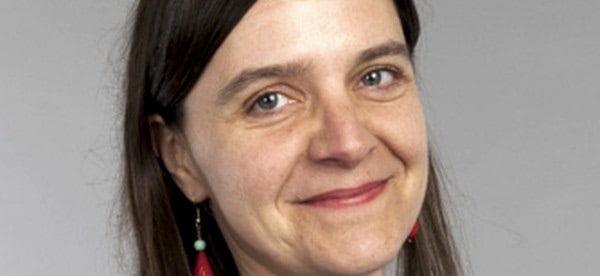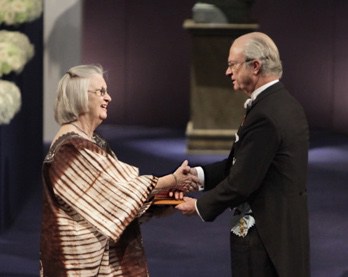Energy Democracy Interview
“Slow clockspeed” is just one typical verdict when it comes to describing the energy industry adopting new developments and changing course. But for Claire Roumet, Energy Cities’ director, it can all be the other way around: “The energy sector should be a role model for societal change at large!” In an interview with Communication Works, she explains why and how it works.
24. January 2018

Communication Works: Claire, please explain “energy democracy”!
Claire Roumet: We at Energy Cities understand the term “energy democracy” as a step towards economic democracy at large with regard to how communities co-operate to share resources. It’s about how those affected by the rules locally, can locally participate in modifying these rules – as broadly described in the Commons Concept by Ellinor Ostrom. [Elinor Ostrom is the first woman ever to be awarded the Nobel in Economics in 2009 for investigating how communities succeed or fail at managing common and finite natural resources.]
Communication Works: What makes the role of the energy system so prominent?
Claire Roumet: The current economic system – the fossil society – has three big resource areas: The financial system, the food system, and the energy system. Their growth paradigm builds on the extraction of natural resources. Traditionally, all progress has been defined by that. That makes a change of the energy that is fueling our economy a key driver for societal change at large.
Communication Works: Why is it so important for your community, the cities?
Claire Roumet: Historically, cities were the places that would benefit from the old system; in terms of jobs, building of infrastructures, and wealth in general. But today, the system delivers more damages than benefits, particularly in the cities: they are literally suffocating under air pollution, health and quality of life for citizens are compromised.
Communication Works: You are known for saying that changes must be made bottom-up? Is it not good enough that institutional and/or incumbent actors do it for them?
Claire Roumet: Digitalisation has radically changed the relationship between citizens and any kind of authority and it exposes the decline of trust in and legitimacy of democratic institutions and processes that has accelerated rapidly during recent years. That’s why cities now need a close connection with their citizens and they need to find ways to include them in decision processes. The energy transition can be a way of addressing the democratic gap and finding ways to close it.
Communication Works: Why would just the energy sector, where the clocks are perceived to tick slower, show the way?
Claire Roumet: Disruptive digital technologies and ever decreasing costs of renewable energy technology make it possible. The public debate focuses much on transport and trade. But it’s the energy sector that is ready for it now. Today.
Communication Works: What are the main obstacles, or who are the main opponents?
Claire Roumet: In the energy sector? I would say the traditional utilities. Because they actually are no more really part of the energy sector.
Communication Works: They aren’t?
Claire Roumet: (laughs) Utilities can be very aggressive, not least when fighting for the concessions. They don’t like to return the power to the cities. There is also risk of seeing some of them hijack the new energy landscape for example by buying the new ideas and start-ups.
Communication Works: Why shouldn’t they?
Claire Roumet: They try and maybe they will. But the new technologies are not just new technologies. It is more a question of the governance that the new technologies make possible. They allow for experimenting with direct democracy. Many start-ups are often strong on ethics, completely open to all. Blockchains for example are a great tool for total transparency
Communication Works: What are the utilities afraid of?
Claire Roumet: …that we do understand that the energy system is far less complicated than they make everybody believe until now. With the ICT-revolution and the internet of things, all systems will speak to each other at local level. And that is an advantage for the cities.
Communication Works: What’s the cities’ own biggest obstacles?
Claire Roumet: It’s their lack of self-confidence. You know, every change is psychology. We’re all moving into completely new territory and it’s difficult to politically balance the interests of very vocal and powerful but “old” actors and the legitimate interests of people.
Also, the way markets are organized and regulated does not yet reflect the new trends and needs. European and national legislation must give cities more room and more power for experimenting locally. Everybody talks about sector integration, but legislation rather hinders it.

Copyright © The Nobel Foundation 2009, Ostrom at the Nobel Prize ceremony in Stockholm
Elinor Ostrom: There is no reason to believe that bureaucrats and politicians, no matter how well meaning, are better at solving problems than the people on the spot, who have the strongest incentive to get the solution right.
Communication Works: What are the strongest forward powers?
Claire Roumet: Technically, decentralisation is at the heart of the change. Politically, the potential of the energy sector for transformation and change might not be so present in the public debate yet, because it is very locally based. But there are many grassroot movements locally, and all of our activities at Energy Cities aim at pushing the snowball and make it bigger. Working together amplifies what each of our members does in their own constituency.
Communication Works: But NGOs like Greenpeace – don’t they push for the same targets?
Claire Roumet: The popular and resilient focus on just climate in the public debate is not supporting a democratic transition of the energy sector. Quite the opposite. This is also where Energy Cities clearly distinguishes itself from other city networks: we do not just want to make cities greener, we want them to be more inclusive, to provide better living conditions for all. Not just an energy transition, but a just energy transition. That also means authorities should not do the job for, but together with their citizens.
Communication Works: You have mentioned the aggressive opposition of the utilities against energy democracy and a transition of the sector. What can be done to avoid this fight between old and new?
Claire Roumet: First of all, it’s up to the new actors to find a role for the old actors – not vice versa, as some interest groups want to make us all believe. But we all need to change our relation with the utilities. They think that they have been entrusted a mission, that they will enjoy this forever. At the same time, some of their engineering knowledge and experienced workforce will be needed. But the big utility structure as such and the way energy companies are governed today will not survive.
Communication Works: Would municipal power companies be so different? As far as we can see, they weren’t very keen on change or interested in citizen participation when they lost their role to the big utilities.
Claire Roumet: True. But there still was and is a different governance in municipal utilities as compared with the big utilities as we know them today. A modern municipal utility has to be more of a public-citizen-partnership. Barcelona is a good example for a participative local government that strives for economic democracy in the energy sector. They offer much better prices than any of the big utilities. Public service is only intermediary. Good governance models still have to be developed. And that is where Energy Cities can add value by starting a debate about how to transfer the energy sector into something more democratic and citizen steered – not to old fashioned but public companies.
Communication Works: Claire, what will the future bring?
Claire Roumet:
The old systems will collapse, be it finance or energy. (laughs) But that’s not the end of the world!
Interview by Niels Reise and Sabine Froning